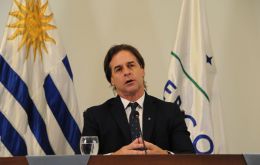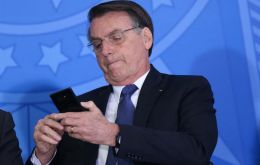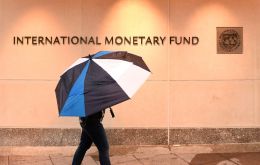MercoPress. South Atlantic News Agency
Stories for December 18th 2021
-
Saturday, December 18th 2021 - 09:57 UTC
Uruguay does not sign joint declaration at Mercosur Summit

Uruguay stood out for its dissenting stance at the 59th Summit of the Common Market of the South (Mercosur) Friday after President Luis Lacalle Pou refused to sign a joint declaration.
-
Saturday, December 18th 2021 - 09:44 UTC
President wants Buenos Aires to no longer be capital of Argentina

Argentine President Alberto Fernández Friday said he was entertaining the idea that the country's capital should not be Buenos Aires, thus resurfacing a controversy from 1853-1860 which then-President Raúl Alfonsín also sough in the 1980s to reshape.
-
Saturday, December 18th 2021 - 09:40 UTC
Police report says Bolsonaro did spread fake news regarding voting system

Brazil's President Jair Bolsonaro was said to have had a “clear purpose” of misleading voters regarding the integrity of the country's electoral system during a Livestream on social media earlier this year, according to a police report released Friday.
-
Saturday, December 18th 2021 - 09:39 UTC
Falklands flagged Sir David Attenborough reaches Rothera Station in Antarctica

Britain’s new polar research vessel, Falklands' flagged RRS Sir David Attenborough, has travelled to Antarctica on its maiden voyage, with its first call on Friday at Rothera Research Station – the UK’s largest Antarctic research station on the continent.
-
Saturday, December 18th 2021 - 09:38 UTC
Bloomberg's pessimistic outlook of Chile's once shinning future

For decades, Chileans watched from afar as their South American neighbors grappled with galloping inflation, financial crashes, and extreme political swings, destabilizing forces that compelled the wealthy to send hundreds of billions of dollars to havens in Switzerland, the Cayman Islands, or the U.S.
-
Saturday, December 18th 2021 - 09:22 UTC
Argentina creates Joint Maritime Command to patrol national waters

Argentine Defense Minister Jorge Taiana announced the creation of the Joint Maritime Command, which will be in charge of the permanent patrolling and monitoring of the Argentine sea.
-
Saturday, December 18th 2021 - 09:20 UTC
Paraguay insists civil servants must wear clothes made of traditional fabric

The Government of Paraguay has issued a decree whereby civil servants are encouraged to wear clothing made of the ancestral ao po'i fabric on Fridays to promote and protect the country's heritage.
-
Saturday, December 18th 2021 - 09:11 UTC
Peru's president under investigation for corruption

Peru's President Pedro Castillo is once again under the spotlight after the Attorney General said his Office was already investigating press allegations that businesswoman Karelim López had paid the head of state offered to help the Puente Tarata III consortium win the tender for a work.
-
Saturday, December 18th 2021 - 09:02 UTC
Global Debt Reaches a Record US$226 Trillion

By Vitor Gaspar, Apulo Medas, and Roberto Perrelli (*) – In 2020, we observed the largest one-year debt surge since World War II, with global debt rising to US$ 226 trillion as the world was hit by a global health crisis and a deep recession. Debt was already elevated going into the crisis, but now governments must navigate a world of record-high public and private debt levels, new virus mutations, and rising inflation.
